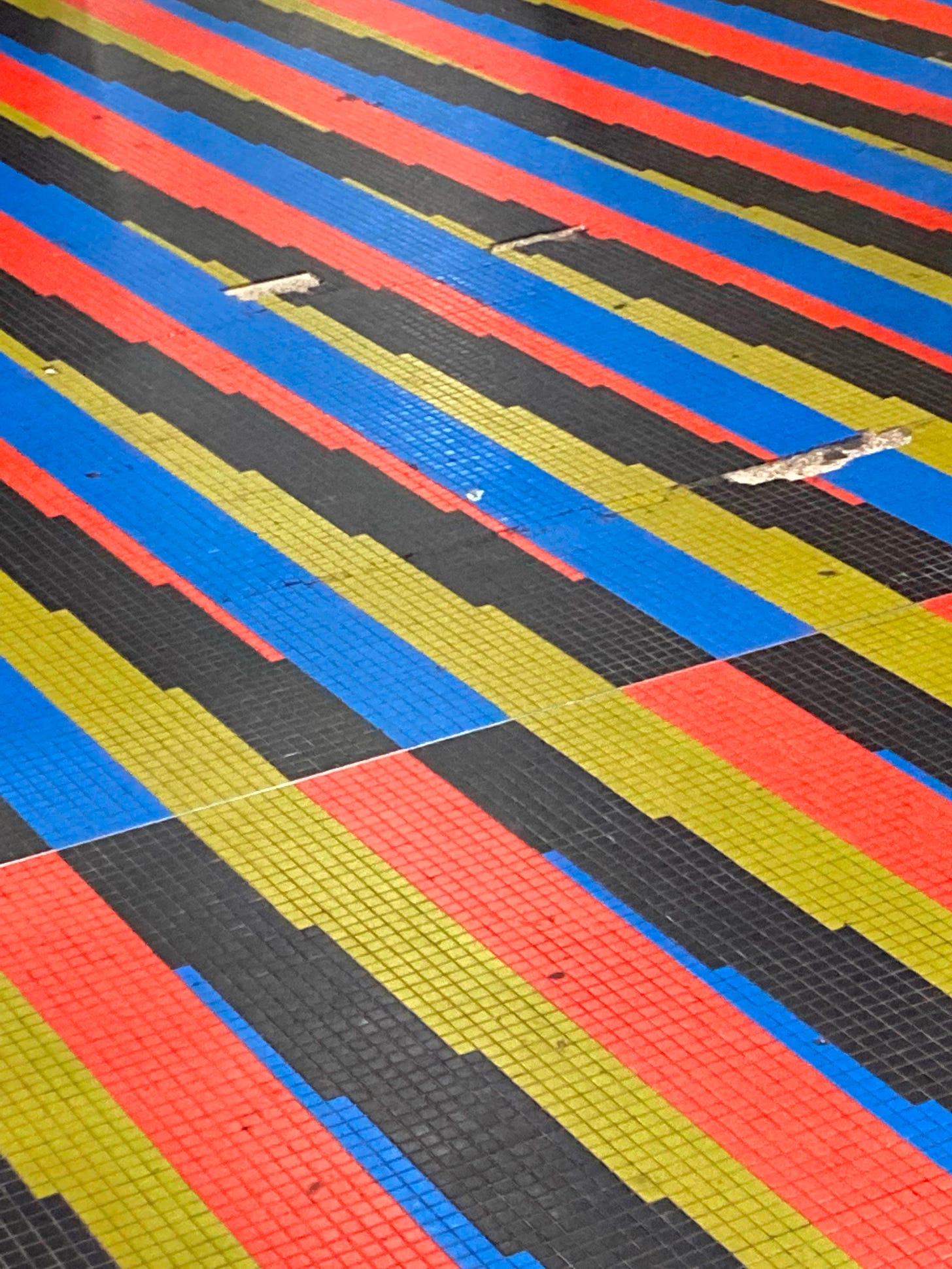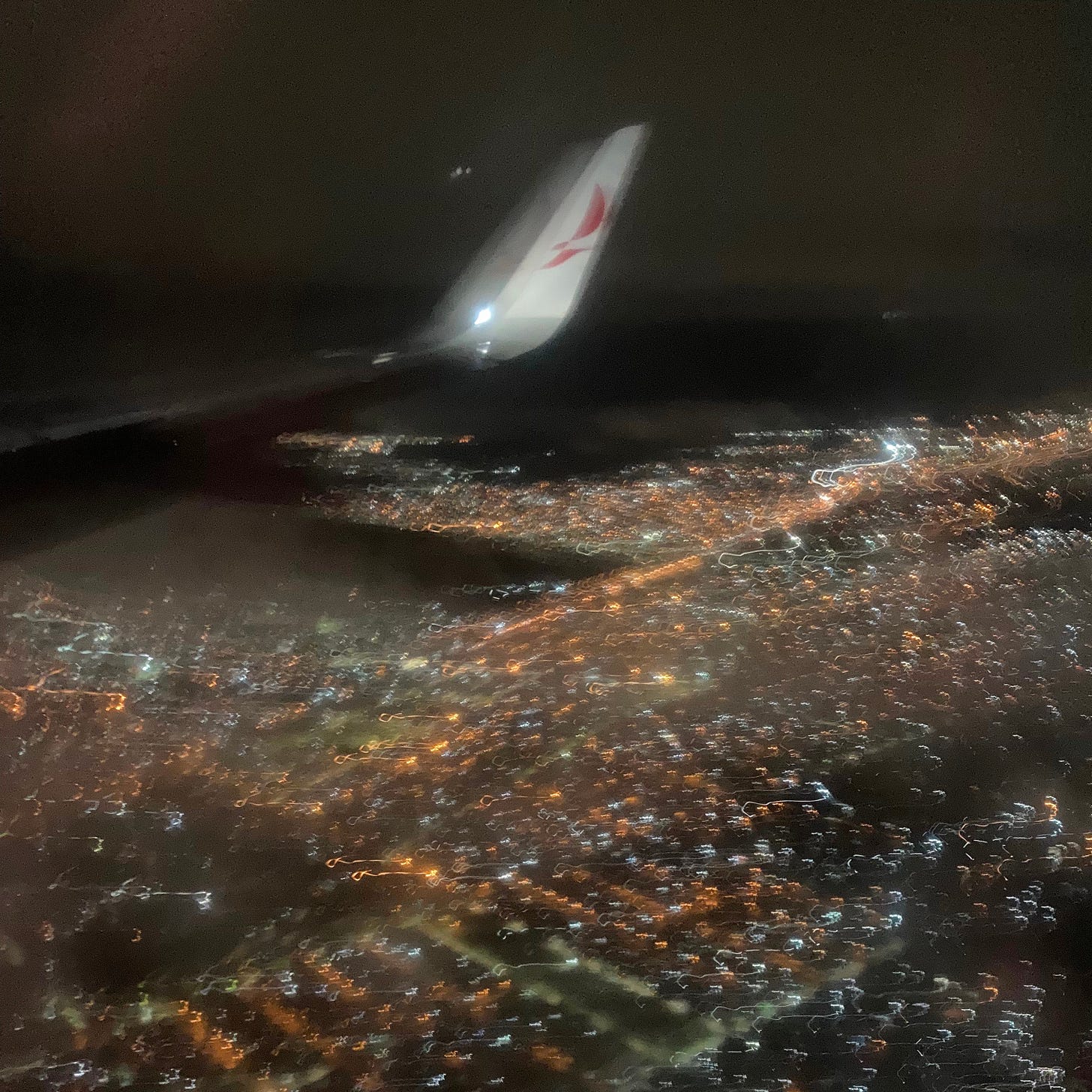LYRIC 002: The Ancestral DDJ (Pt. I - NYC)
A two-part essay on Arca, channeling ancestors through dance, and starting over.
“...a writer’s homeland is not his tongue, or not only his tongue, but also the people he loves. And sometimes a writer’s homeland is not the people he loves but his memory.”
—Roberto Bolaño, The Caracas Speech (1999)
The Ávila wasn’t in view. Neither was the sea. At Maiquetía for the first time in sixteen years, I was self-conscious. My new passport was empty, amateur. I had been raised an ocean away on horror stories. By the time I got to the guard at the aduana, he gave my passport its first stamp without so much as a “bienvenidos a la patría, ciudadano” or a raised eyebrow. I was another Venezuelan, waiting to get picked up by Papi’s padrino Wil. Outside, the night was humid, but just a little. Miami still in my bones. New York was humid too, in a disgusting way. This humidity was fresher. I knew the days ahead would be hot. Still. I was excited to walk the boulevards, to plan my week at the Quinta Nefrán, the ancestral home of Papi’s primos the Padillas. This week was for flowers on graves, light sight-seeing, family reunions, and raving.

I saw the cobwebs through the windowpane. Just once was enough. I forget who told me the joke about wanting to renew a Venezuelan passport in New York City: that nobody has been there for so long, the consulate is run by spiders. I never imagined it to be true. It made me feel hopeless.
Having been raised in Florida, I have distorted memories of my birthplace. They began as diasporic romanticizing of a complicated nation marred by grief, and ended with resignation at the impossibility of return. The memories come back in fragments. Walking alone to the mall at Plaza Manzanares where I bought Abuela Teresa pirated DVDs. Quinta Nefrán, where I took my first steps. Tía Marite’s apartment in Alto Prado with the view of the Ávila where my primo blasted Calle 13 and blink-182 and Rage Against The Machine and (at my request) Madonna on his desktop while we played Pokemón Stadium on his Nintendo 64. The Iglesia Santa María Madre de Dios, where I was baptized and where my parents were wed, with its imposing wooden Christ, its tall as heaven stained glass with the images of the lamb and the lion and the wolf and the angels of the Apocalypse.
The abandoned embassy is thirty-eight blocks from the Guggenheim Museum, which held a retrospective of German-Venezuelan artist Gego’s work that closed September 2023. I remember walking through it, enjoying the space between the fragile sculptures, and thinking that my people were never far from me despite geography and time. Twenty-two blocks down from the museum is the Park Avenue Armory where, a month after the Gego show, Arca was to start a five-day residency.
It was my last week living in New York. I had to make a hard decision between Arca’s opening night and Devendra Banhart’s tour stop. It felt like the Venezuelan factions of the city were split between indie bros who didn’t attempt to look deeper into Banhart’s use of an Issey Miyake gown as the central aesthetic of his new album and, well, actual queers.
The choice was clear. I wrote to the publicist and got a +1. V came with me. We were in the evening’s uniform: dark sunglasses, leather, designer. It was hilarious, how you could tell on the uptown 6 just before the 59th Street - Lexington Avenue stop, who lived in the neighborhood and which Rick Owens vampires came to dance. “We got a lot of fashionistas tonight,” exclaimed an older woman to herself, clutching her pomeranian as she walked past a long parade of us.
Arca was feeling cheeky. After an elongated surrealist haute couture intro, she appeared not on the sprawling three-part stage but in the room’s upper back. She kicked off with “Piel”, voice operatic, soaring, tremulous. She disappeared, materializing on the floor below where we all stood mesmerized. Some of us were wiping tears behind chic oversized shades. The “click-clack” of her heels echoed through the room, amplified, she revealed later, by a midi attached to each shoe. Onstage, she takes off her oversized leather jacket —Rick? Issey?— to reveal light up red nipples, a harness, sequins, the glory of the engineered footwear shimmering as she launches into “Reverie”.
It’s an eclectic opening night. Arca’s more than earned the moniker of a “diva experimental.” Pop dramatics and an aesthetic firmly out of the queer rave. She’s having fun, running around onstage sipping champagne, a playground with an audience. The whole room was used, stage sprawling with an imposing set of decks and turntables, a leather sex swing surrounded by flowers, and a Baby Grand Piano she personally reengineered to extend its tones, something she explains casually. Seated regal in front of that very piano Arca asks for a moment. “Estoy emocional,” she says, a silent room punctuated with a “YAAS” that’s quickly shut down as Arca begins to play. Bathed in blue light, with the piano’s tones elongated to an ethereal limit, she takes her moment. She’s teary as she gets through it, eventually taking off her lashes and turning up the synths. She apologizes for being emotional, and starts the dance-heavy portion of the night.
She’s strapped to a futuristic dentist’s chair and sings “Incendio'', her face filmed and writhing on the screen. The cables attached to her mimic her motions on the screen, face-twitching and twisting. Then the catwalk for “Mequetrefe”, queen strutting before her enraptured subjects. Arca has gentle moments, twirling to “Calor”, and asking the audience what they want from her. “I love to ki,” she offers. And so she does, going into the crowd near the central runway talking and laughing with everyone, at one point connecting with a fan donning the iconic red jersey of the Vinotinto, the Venezuelan fútbol team, or singing another fan happy birthday.
Before a charged closing set where she gets us throwing it back —how many neoperreo gays wait with bated breath to see the transition from “Prada” to “Rakata” live— she says it: “Voy a estar en Venezuela en marzo”.
Deafening applause. She’s all out on the catwalk now, a vamping diva, wiping fake blood off her person (how did it get there? I still don’t know.) In between making us writhe, she pauses. Arca admits to the crowd: “I am grateful, I am moved, I am feeling like a vessel for something greater than myself”. She ends with “No Queda Nada”. Time stops between the rain of reflective confetti.
I’m stuck on the fact that Arca will be in Caracas in March. I’ve silently made a promise to myself to go, a few days after my 28th birthday, if my passport is renewed. It’ll be the first time she has come home post-transition this publicly. She’s played Caracas before as Nuuro, when she was a hot little early 2000s Julian Casablancas look-alike. Some of us have always been beautiful. Venezuelans have that as one of our stereotypes.
I was ugly, for a long time, or I thought I was. That all changed for me when I heard “Reverie” for the first time. I think I was twenty-three, partying too much in Bushwick, smoking too much on fire escapes and kissing boys who fetishized me. The song makes use of Simon Diaz’s “Caballo Viejo”, one of our country’s most important songs and one of the best songs written about desire. The yearning is drawn out, and Arca stretches it further in her reimagining. After directly quoting the lyrics before launching into her own pining, her voice goes between high falsetto and a deep rumble, a tremor between the binary and through the slit. Amame otra vez / Si te atreves. Love me again, if you dare.
Part II —a dispatch from Caracas—drops Thursday.





